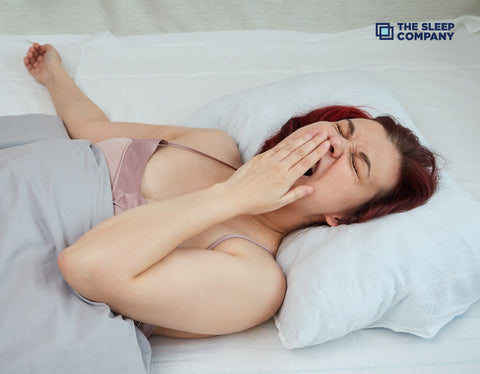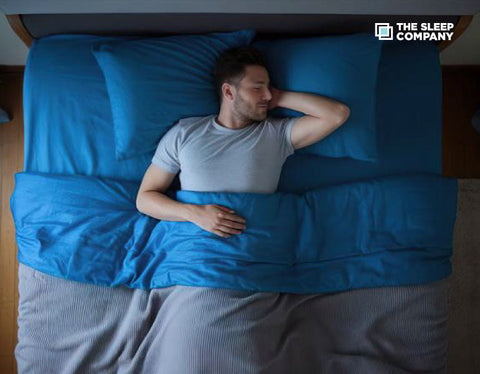My Cart

How to Get Rid of the Fear of Sleeping Alone?


Every bodily function depends on sleep, including our ability to fight off illness, build immunity, regulate our metabolism, and reduce our chance of developing chronic diseases. Sleep also has an impact on how we will feel and think the next day. Because it affects every facet of health, sleep is really multidisciplinary.
Every component of the body needs sleep, but young children’s developing bodies and minds make sleep even more crucial. Lack of sleep or poor quality sleep in young children can lead to challenging behaviors, a reduced ability to absorb and retain knowledge, a propensity for unhealthy eating habits, and weight increase.
Teenagers require about 8 to 10 hours of sleep per night, yet a large percentage do not. For instance, according to current estimates, 60% of middle schoolers and 70% of high school students don’t get enough sleep on school nights. The biochemical changes in adolescents’ brains that affect when they feel sleepy are one of the key causes of their extreme sleepiness. So, despite their lack of sleep, people frequently struggle to get to bed early since their brain is not yet ready for sleep.
How to sleep peacefully

Everybody occasionally has problems falling asleep. Lack of sleep, however, can have a negative impact on your health and make it challenging to get through the day if it occurs frequently.
Some individuals have difficulty falling asleep peacefully. Others can’t fall back asleep after awakening in the middle of the night. To make sleep less irregular, you can alter your routines and your living space. Discover how to sleep soundly using these techniques.
- Respect a sleeping pattern. Read a book or do something else peaceful and soothing. This may also help you forget that you aren’t getting any rest. Return to bed when you start to feel sleepy.
- Make sure your bedroom is cozy. Purchase a cozy mattress. You may have trouble falling asleep if your mattress is bumpy, too soft, or too rigid.
- Remain calm. As you sleep peacefully, your body temperature drops. Make sure the temperature in your bedroom is just right—not so cold that you can’t sleep. To choose the ideal temperature for you, experiment with the temperature and the sheets.
- Adjust the light. It can be difficult to stay asleep if there is light from the street, a TV, or the adjacent room. To create darkness in your room so you can sleep, use curtains and doors. Another option is to use a sleep mask.
- Minimize your evening activities. Your day could not conclude until late at night if you are constantly on the move. Try to keep your weekly evening plans to a few nights. Allow yourself time for a relaxing nighttime routine to aid in getting ready for sleep.
- Exercise. You’ll fall asleep peacefully if you exercise frequently. Just be sure to properly schedule your workout. You may have trouble falling asleep if you overtrain or exercise less than three hours before bed.
- A decent mattress provides the ideal amount of support and comfort while maintaining the body’s natural posture and spinal alignment, greatly improving the quality of sleep. For a wonderful experience, consider mattresses from high-end manufacturers like The Sleep Company.
How can I sleep peacefully by myself?
There are many factors that make it difficult to fall asleep alone, but there are also various solutions you can try. You can find it difficult to fall asleep by yourself due to fear, bad habits, hormones, or sorrow.
Particularly when they are alone, many people have trouble falling asleep. Some people need the comfort that comes from having another person home, even if they are not physically in the same room. Some people need a co-sleeper to sleep soundly.
Sleeping peacefully with a pet dog is advised since it can have the same benefits as sleeping with a mate. One may be able to overcome the anxiety of sleeping alone by cuddling with a cat or dog, which releases the hormone oxytocin. Use relaxation techniques to help you unwind and improve your chances of having a pleasant night’s sleep alone. Some strategies to try include taking long, slow, deep breaths, slowly relaxing your muscles while concentrating on your breath, and visualizing a relaxing environment.
I don’t like to sleep alone, what should I do?
A sleep problem called somniphobia or sleep anxiety is characterized by discomfort while sleeping alone or a generalized fear of dozing off. People who experience homophobia describe it as intense worry that prevents them from falling asleep, even when they are exhausted.
I’m scared to sleep alone, what should I do?

Some cases have a clear link to childhood trauma, whereas others are caused by a traumatic event that occurred in adulthood. The panic may be brought on by dreams, a terrifying incident of sleep paralysis, or phobias related to rats prowling around the house. It may also be brought on by the expectation of theft or a medical emergency.
- Accept: You should start by acknowledging your concern about sleeping alone and your desire to combat it.
- Secure your house: Before going to bed if you’re worried about burglaries, make sure your door is locked, your windows are closed, and the watchman is outside. Your mind will be at peace knowing that your home is protected.
- Listen to a guided meditation before bed to learn how to meditate. It will help you visualize joyful scenes and divert your thoughts from stressful ones.
- Practice affirmations by repeating at least three of them three times before sleeping peacefully. You can repeat mantras like “I am ready for sleep now.” As I lay down, I feel secure and at ease. I’m only thinking good things as I go off to sleep right now. Walk for 45 minutes each day to relieve stress, and do breathing exercises.
Key conclusions
- The quality of your night-time sleep may be impacted by what you do during the day.
- You may get the kind of rest you desire and need by setting up the proper conditions, selecting the proper sleeping posture, and developing healthy sleeping habits.
Consult a qualified medical professional if you have tried to improve your sleep quality but have been unsuccessful, feel worn out all the time, or have other sleep-related concerns.
FAQs
The fear can stem from past trauma, sleep-anxiety (somniphobia), nightmares, sleep paralysis, or worries like home security or being vulnerable during the night.
Yes. The blog calls it somniphobia or sleep anxiety — a condition that prevents people from falling asleep alone because of intense worry.
Yes. The blog suggests that sleeping with a pet (dog or cat) may help, because cuddling releases oxytocin, which is calming.
Repeating positive affirmations or mantras helps shift thoughts away from fear toward feelings of safety and calm. It can reduce the mind’s focus on anxiety as you try to go to sleep.
If worrying about sleeping alone severely disrupts rest, causes chronic tiredness, or doesn't improve despite trying self-help strategies, it may be time to consult a qualified medical or mental health professional.


































































